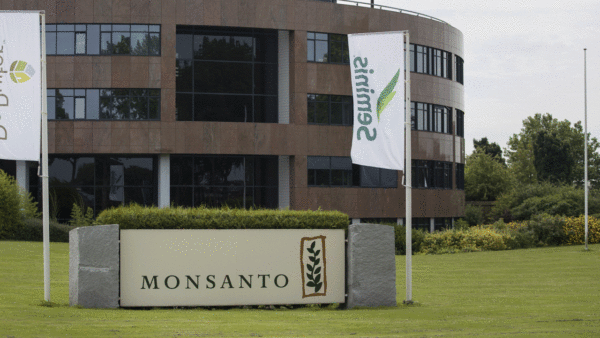

Monsanto will soon be no more.
The German pharmaceutical company Bayer has been in the process of buying the company for more than two years, and the $66 billion deal is finally closingthis week. On Monday, Bayer (BAYRY, +0.84%) announced in a statement that it had received all the necessary regulatory approvals to buy Monsanto, and that they would retire the 117-year-old name of “almost surely the most vilified company on the planet.”
“Bayer will remain the company name. Monsanto will no longer be a company name. The acquired products will retain their brand names and become part of the Bayer portfolio,” the statement said.
Acquirers don’t typically change the names of the companies they’re buying when it’s as well-recognized to its customers as Monsanto is, but in this case, it may be the best option. Here’s why.
Agent Orange, DDT, GMOs
As recognizable as the name “Monsanto” is to its customers, it’s almost better known among its detractors. Monsanto was established in 1901 as a chemical business, and has found itself at the center of some of the biggest controversies of the 20th and 21st centuries. The chemical Agent Orange, which was weaponized and demonized during the Vietnam era, was produced under the name Monsanto. The company was also among those that produced DDT, a now-banned pesticide. In recent years, the name has become virtually synonymous with Genetically Modified Organisms (GMOs) and the target of much of the protest against them.
For all the ire Monsanto gets from its detractors, its loyal customers aren’t always happy either. In 2008 when the company pledged to become carbon-neutral by 2021, some of the company’s customers said it was giving in to the government and activists in acknowledging that climate change is even partly man-made.
But is erasing ‘Monsanto’ enough?
From a PR perspective, getting rid of “Monsanto” will make things much simpler. But it’s possible that Bayer hasn’t gone far enough by putting Monsanto to bed. Although Monsanto will be a thing of the past, some of its brand names, which will become part of the Bayer portfolio, draw almost as much controversy as the parent company. For instance, the pesticide Roundup is probably the best-known pesticide among non-specialist audiences. In 2017, California listed its active ingredient, glyphosate, as a chemical known to cause cancer. Later that year the EU parliament voted in a non-binding resolution to ban the pesticide by 2022, though the chemical was later given a new five-year license.
more recommended stories
 Fentanyl Seizures at Border Continue to Spike, Making San Diego a National Epicenter for Fentanyl Trafficking
Fentanyl Seizures at Border Continue to Spike, Making San Diego a National Epicenter for Fentanyl TraffickingFentanyl Seizures at Border Continue to.
 Utah Man Sentenced for Hate Crime Attack of Three Men
Utah Man Sentenced for Hate Crime Attack of Three MenTuesday, August 8, 2023 A.
 Green Energy Company Biden Hosted At White House Files For Bankruptcy
Green Energy Company Biden Hosted At White House Files For BankruptcyAug 7 (Reuters) – Electric-vehicle parts.
 Former ABC News Reporter Who “Debunked” Pizzagate Pleads Guilty of Possessing Child pδrn
Former ABC News Reporter Who “Debunked” Pizzagate Pleads Guilty of Possessing Child pδrnFriday, July 21, 2023 A former.
 Six Harvard Medical School and an Arkansas mortuary Charged With Trafficking In Stolen Human Remains
Six Harvard Medical School and an Arkansas mortuary Charged With Trafficking In Stolen Human RemainsSCRANTON – The United States.
 Over 300 People Facing Federal Charges For Crimes Committed During Nationwide Demonstrations
Over 300 People Facing Federal Charges For Crimes Committed During Nationwide DemonstrationsThe Department of Justice announced that.
